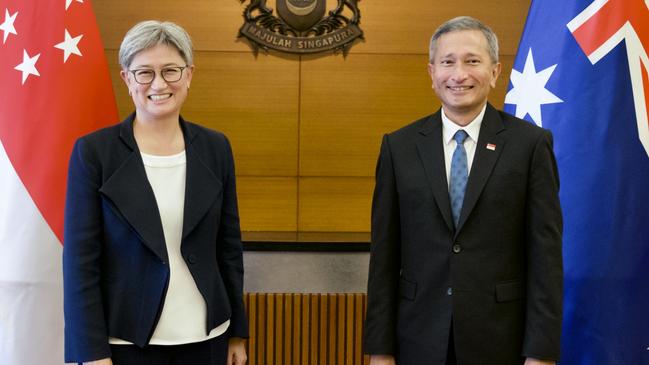Penny Wong underlines our ASEAN ties
Penny Wong has spelled out Southeast Asia’s critical importance to Australia in a landmark foreign policy speech in Singapore.

Penny Wong has spelled out Southeast Asia’s critical importance to Australia in a landmark foreign policy speech in Singapore in which the Foreign Minister called for an urgent, collective effort to shape our region’s future to avoid becoming “supporting players in a grand drama of global geopolitics”.
In her second major policy address in as many weeks in Southeast Asia – her third regional visit since the election – Senator Wong emphasised ASEAN’s role as an underwriter of regional security and prosperity, but urged it to see how new alignments, including the Quad and AUKUS, could help the neighbourhood.
She also promised to keep Australia’s regional partners informed on the progress of its bid to acquire nuclear-powered submarines in yet another nod to regional nervousness that the AUKUS security pact could trigger a regional arms build-up.
“Our links to the world are shaped by the contours of Southeast Asia’s mainland, through its archipelagos and around its islands. What happens in, to and through this region will be strategically central to Australia’s future,” she told Singapore’s International Institute for Strategic Studies before flying to Bali on Thursday for the G20 foreign minister’s meeting.
“ASEAN centrality means we will always think about our security in the context of your security.
“We believe that Australia must find its security in Asia, not from Asia. And that means, above all, in Southeast Asia.”
As she did in Malaysia last week, Senator Wong emphasised the importance of working towards a “strategic equilibrium” in the region “where countries are not forced to choose but can make their own sovereign choices, including about their alignments and partnerships”.
Ahead of a predicted showdown in Bali on Friday between Western G20 foreign ministers and Russia’s Sergey Lavrov, she condemned Moscow’s invasion of Ukraine as “unprovoked, illegal, immoral, inhumane”.
“It has brought death and suffering on innocents. It has exacerbated global hunger, disrupted food exports, increased energy prices and raised fertiliser costs, causing global food prices to spike. Russia’s blockade of seaports has disrupted Ukraine’s growing season and capacity to export agricultural commodities – with serious consequences for food security in many countries, including in Southeast Asia.”
ASEAN nations have largely sought to stay out of the conflict, though Singapore has imposed targeted sanctions on Russia and Indonesian President Joko Widodo, this year’s G20 chair, held talks with President Volodymyr Zelensky in Kyiv and Vladimir Putin in Moscow last week to try to ease Russia’s blockade of grain exports.
How to address that global food insecurity will be at the top of the agenda during Friday’s talks, which Mr Lavrov will attend in person and Ukrainian Foreign Minister Dmytro Kuleba will join virtually.
Australia has urged Beijing to use its influence as a “no limits” partner to Russia to end the war, and Senator Wong did so again on Wednesday, drawing subtle parallels between Russia’s actions in Ukraine and China’s territorial expansionism across the disputed South China Sea.
“The region and the world is now looking at Beijing’s actions in relation to Ukraine. But this has also been true in respect of its regional actions, as its strategic outreach has intensified,” she said.
“Regardless of the character of leadership Beijing chooses to demonstrate, we all have our own choices to make, and our own agency to exercise. We are more than just supporting players in a grand drama of global geopolitics, on a stage dominated by great powers. It is up to all of us to create the kind of region we aspire to – a stable, peaceful, prosperous and secure region.”








To join the conversation, please log in. Don't have an account? Register
Join the conversation, you are commenting as Logout